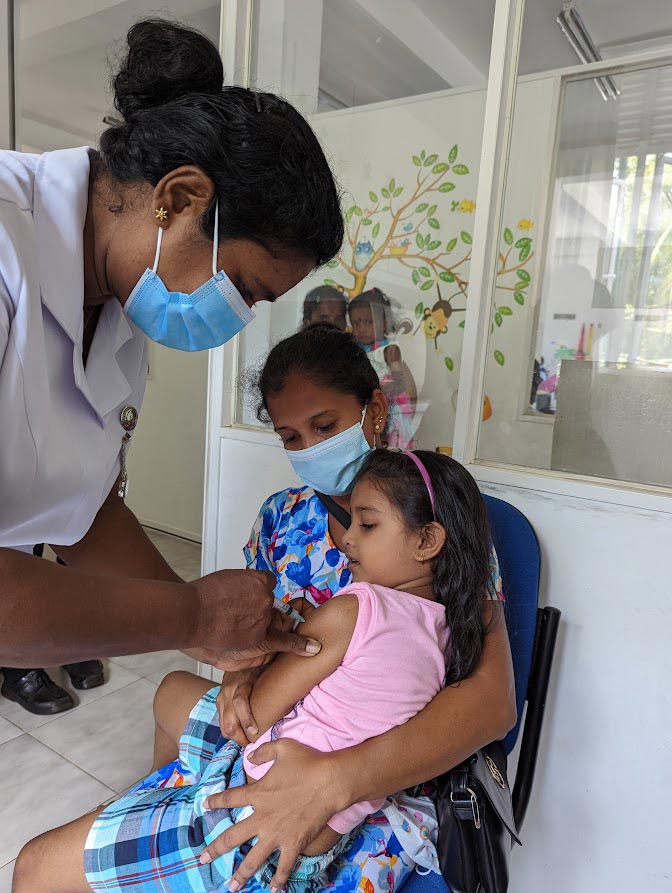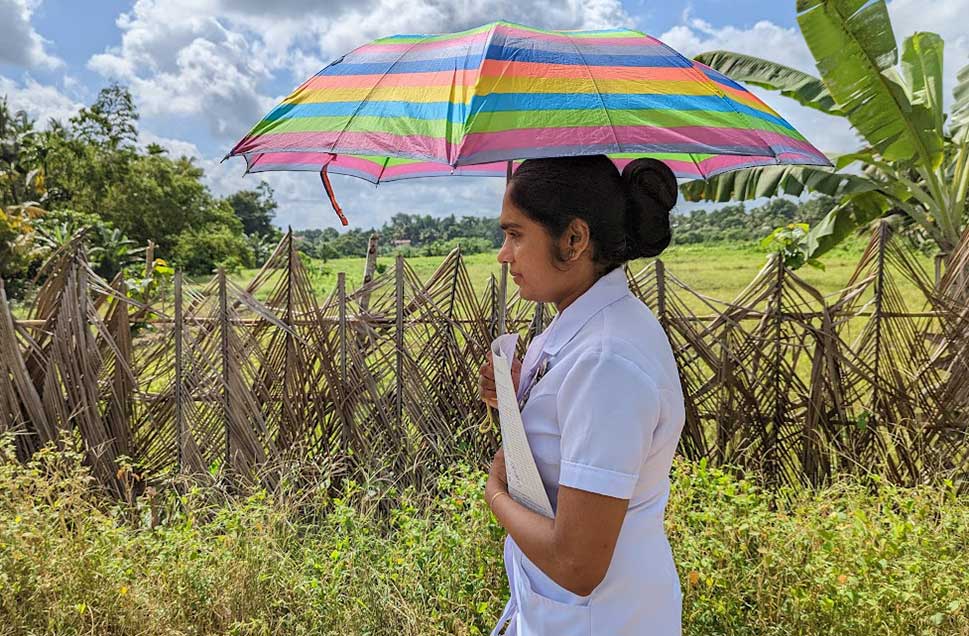Keeping communities healthy: Meet the midwives of Sri Lanka
Public health midwives (PHM) are integral to maternal and child health across Sri Lanka.
- 19 October 2022
- 4 min read
- by Aanya Wipulasena

PiliyandalaK. V. P. Susangika, known as Susangi-miss by villagers in Gorakapitiya in Sri Lanka’s Western Province, sits on the veranda waiting patiently. It is around eight in the morning, and the new mother she came to meet has just woken up.
As the public health midwife (PHM) in her area, Susangi-miss often visits newly married couples, pregnant mothers, new mothers and their new-born babies.
Statistics for 2021 from the Family Health Bureau show that 93.9% of pregnant mothers were visited in their homes at least once by a PHM, while the percentage of visits to post-partum mothers at or around 42 days after birth was 80.4% the same year.
Today she is at Sithu Liyanarachchi's home. In the coming weeks, Sithu's two-month-old baby needs to get the first dose of polio, hepatitis B and pentavalent vaccines, which provide protection against life-threatening diseases.
The young mother comes outside and sits on a plastic chair next to Susangi-miss, who explains the importance of not missing the scheduled vaccines.
"Sithu, this vaccine is given to guard your baby against diseases like Hepatitis B and polio. It is essential that you don't miss the date for the vaccination. You can always call me if you need more information," she tells Sithu and hands over a report after jotting down the date for the next immunisation.
PHMs in Sri Lanka have an important role to play in maternal and child health. On average, one PHM takes care of a population of between 3,000 and 5,000 people in her area. Susangi-miss looks after 5,500 people.
"PHMs are keeping our communities healthy," Dr Chithramali De Silva, the Director of Maternal and Child Health at the country's Family Health Bureau says. "They go to the grassroots level and provide total care to people, which is essential."

Credit: Aanya Wipulasena
The health workers maintain field clinics and make door-to-door visits so that no child goes unvaccinated. They painstakingly gather and record data about their community to ensure that no one is left behind. By creating awareness about immunisation, PHMs have created a positive impact with more and more mothers seeking vaccines at each necessary point of their children's lives.
Have you read?
Statistics for 2021 from the Family Health Bureau show that 93.9% of pregnant mothers were visited in their homes at least once by a PHM, while the percentage of visits to post-partum mothers at or around 42 days after birth was 80.4% the same year.
If a mother is hesitant to vaccinate her baby, the PHM will visit her house several times to educate her about timely immunisations. She also encourages mothers to keep her informed about any reactions the baby may have to the vaccine and, in the case of such reactions, will refer mother and child to a doctor, when needed.
“When you have a baby, you worry constantly,” Sithu says, “But I don’t feel alone. Susangi-miss came to check up on me when I was pregnant, and she is here after the baby is born. I trust her like a family member."
According to a report by UNICEF titled Sustaining Vaccine Coverage in 2019, PHMs are an "accepted and trusted source of care" in Sri Lanka.
"The use of PHMs who bring health and health education to people's front door, means that almost all children (99.1%) receive their vaccinations in a timely, people-centred manner, whilst assuring high-quality standards," the report further states.
For Sithu, having Susangi-miss around is like having a trusted friend who is just a phone call away when she needs help.

Credit: Aanya Wipulasena
“When you have a baby, you worry constantly,” Sithu says, “But I don’t feel alone. Susangi-miss came to check up on me when I was pregnant, and she is here after the baby is born. I trust her like a family member. So, when she comes and tells me to come to the clinic to get a vaccine, I know that it is for my baby's well-being."
Back in her office, Susangi-miss has a visitor. A mother whose child she helped to get admitted to a school close by has come to thank her for her kindness.
Susangi-miss tells the mother, a single parent and a daily wage earner, to go to a shop close to the school once a week for a free meal for her child. She has already informed the shop owner about the struggling mother, and he has offered to help.
“This is what I love about my job,” Susangi-miss says after the mother leaves. “We get to do everything we can to make a difference in a child’s life. Even if I don’t get anything in return, if a child lives a happy and healthy life that is enough for me.”








